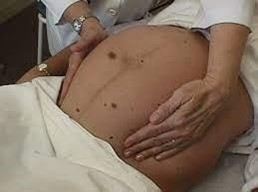A nurse is caring for a postpartum client and her newborn. The client asks the nurse to feed the newborn. Which of the following responses should the nurse make?
"You should feed the baby yourself because you'll be going home tomorrow."
"I’ll feed him today. Maybe tomorrow you can try it."
"It's not difficult at all. You'll be fine."
"Feeding an infant can feel a little intimidating at first, but I'll stay with you to help."
The Correct Answer is D
Choice A rationale: This response is not supportive and may cause the client to feel pressured or inadequate. It is essential to be empathetic and understanding of the client's feelings and needs.
Choice B rationale: The nurse should encourage the client to begin breastfeeding and offer support if needed. This response does not promote the client's active involvement in caring for her newborn.
Choice C rationale: While breastfeeding is a natural process, it can be challenging for some women, especially in the early days. This response may minimize the client's concerns and emotions.
Choice D rationale: The nurse should be supportive and reassuring to the postpartum client. The client may be feeling overwhelmed or uncertain about breastfeeding, so offering assistance and staying with the client to help with the first feeding is an appropriate and compassionate response.
Nursing Test Bank
Naxlex Comprehensive Predictor Exams
Related Questions
Correct Answer is C
Explanation
Choice A rationale: While colostrum is present in the first few days after delivery, it takes a few more days for breast milk to "come in" and increase in volume.
Choice B rationale: Waiting for 6 to 8 days for breast milk to come in would be too long after childbirth. Breast milk typically "comes in" sooner, around 3 to 5 days after delivery.
Choice C rationale: Colostrum, the first milk, is typically produced in small amounts during the first few days after delivery. Breast milk usually "comes in" or increases in volume around 3 to 5 days after childbirth. This transition from colostrum to mature milk is normal and expected.
Choice D rationale: Waiting for 10 days for breast milk to come in would be too long after childbirth. Breast milk typically "comes in" sooner, around 3 to 5 days after delivery.
Correct Answer is A
Explanation
Choice A rationale: Auscultating fetal heart tones in the right upper quadrant is not appropriate based on the information provided by Leopold maneuvers, which indicates the fetal back is on the right side of the mother's abdomen, and the fetal head is in the fundal portion of the uterus.
Choice B rationale: During Leopold maneuvers, the nurse palpated a round, firm, movable part in the fundal portion of the uterus. This finding corresponds to the fetal head, which is typically located at the top of the uterus (fundus). Additionally, the nurse palpated a long, smooth surface on the mother's right side. This finding indicates the fetal back, which typically lies along the right side of the mother's abdomen, suggesting that the fetus's back is positioned anteriorly (toward the mother's front). The location of the fetal heart is typically best heard over the back of the fetus. Therefore, the nurse should auscultate the fetal heart tones in the maternal quadrant corresponding to the back of the fetus, which is the left lower quadrant.
Choice C rationale: The information from Leopold maneuvers does not indicate the fetal back is in the right lower quadrant. The nurse should not auscultate fetal heart tones in this area.
Choice D rationale: Auscultating fetal heart tones in the left upper quadrant is not appropriate based on the information provided by Leopold maneuvers, which indicates the fetal head is in the fundal portion of the uterus and the fetal back is on the right side of the mother's abdomen. The fetal heart is usually best heard over the back of the fetus, which is not in the left upper quadrant.

Whether you are a student looking to ace your exams or a practicing nurse seeking to enhance your expertise , our nursing education contents will empower you with the confidence and competence to make a difference in the lives of patients and become a respected leader in the healthcare field.
Visit Naxlex, invest in your future and unlock endless possibilities with our unparalleled nursing education contents today
Report Wrong Answer on the Current Question
Do you disagree with the answer? If yes, what is your expected answer? Explain.
Kindly be descriptive with the issue you are facing.
